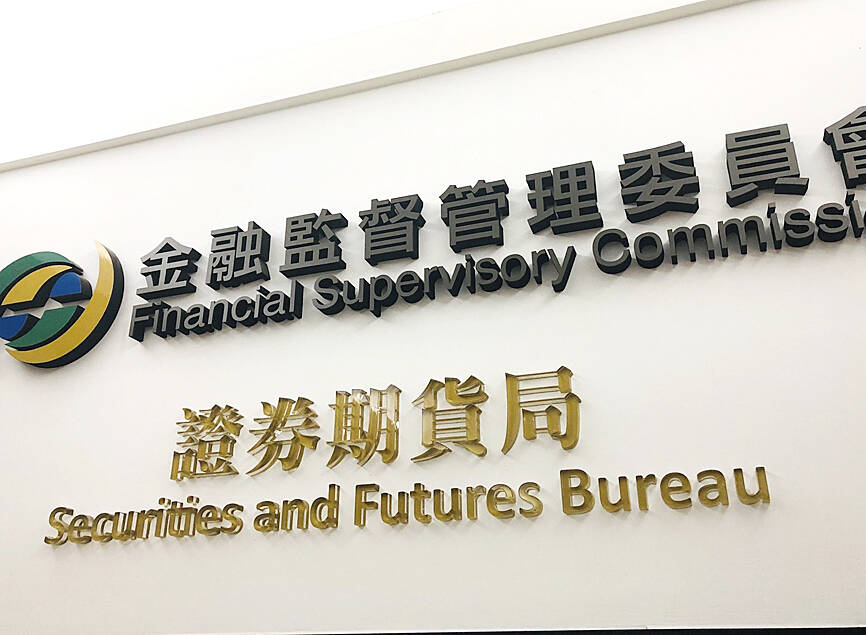The aggregate pretax profit posted by companies on the Taiwan Stock Exchange and over-the-counter (OTC) market in the first half of this year soared more than 30 percent year-on-year, the Financial Supervisory Commission (FSC) said.
Data compiled by the FSC showed that companies listed on the local main board and the OTC market posted NT$1.93 trillion (US$60.36 billion) in profit before tax for the first half of this year, up 31.2 percent from a year earlier and the third-highest total in a decade.
First-half aggregate pretax profit only trailed NT$2.48 trillion recorded in the same period of 2022 and about NT$2 trillion seen in the first half of 2021, the data showed.

Photo: Kelson Wang, Taipei Times
In terms of consolidated sales, the data showed that companies listed on the Taiwan Stock Exchange and OTC registered a 9.5 percent year-on-year increase in the first half of this year, with a value of NT$18.96 trillion.
Companies listed on the local main board posted NT$1.775 trillion in pretax profit, up 32.27 percent from a year earlier, while firms listed on the OTC market registered a 19.89 percent year-on-year increase in pretax profit at NT$152.5 billion.
Commenting on the profitability among listed companies on the main board, Securities and Futures Bureau Chief Secretary Shang Kuang-chi (尚光琪) said that the local semiconductor industry got a boost from global demand for artificial intelligence (AI) devices, while a rebound in the smartphone market also lent support to export-oriented manufacturers.
Shang said that the local computing industry saw its profitability improving in the wake of robust demand for AI servers.
In addition, tight supply of cargo shipping space pushed up freight rates and added momentum to the transportation sector.
Firms listed on the OTC market benefited from an increase in shipments of electronic components and foreign exchange gains, Shang said, adding that the cultural creative industry saw revenue increase on strong demand for gaming apps.

BYPASSING CHINA TARIFFS: In the first five months of this year, Foxconn sent US$4.4bn of iPhones to the US from India, compared with US$3.7bn in the whole of last year Nearly all the iPhones exported by Foxconn Technology Group (富士康科技集團) from India went to the US between March and last month, customs data showed, far above last year’s average of 50 percent and a clear sign of Apple Inc’s efforts to bypass high US tariffs imposed on China. The numbers, being reported by Reuters for the first time, show that Apple has realigned its India exports to almost exclusively serve the US market, when previously the devices were more widely distributed to nations including the Netherlands and the Czech Republic. During March to last month, Foxconn, known as Hon Hai Precision Industry

Taiwan Semiconductor Manufacturing Co (TSMC, 台積電) and the University of Tokyo (UTokyo) yesterday announced the launch of the TSMC-UTokyo Lab to promote advanced semiconductor research, education and talent development. The lab is TSMC’s first laboratory collaboration with a university outside Taiwan, the company said in a statement. The lab would leverage “the extensive knowledge, experience, and creativity” of both institutions, the company said. It is located in the Asano Section of UTokyo’s Hongo, Tokyo, campus and would be managed by UTokyo faculty, guided by directors from UTokyo and TSMC, the company said. TSMC began working with UTokyo in 2019, resulting in 21 research projects,

Taiwan’s property market is entering a freeze, with mortgage activity across the nation’s six largest cities plummeting in the first quarter, H&B Realty Co (住商不動產) said yesterday, citing mounting pressure on housing demand amid tighter lending rules and regulatory curbs. Mortgage applications in Taipei, New Taipei City, Taoyuan, Taichung, Tainan and Kaohsiung totaled 28,078 from January to March, a sharp 36.3 percent decline from 44,082 in the same period last year, the nation’s largest real-estate brokerage by franchise said, citing data from the Joint Credit Information Center (JCIC, 聯徵中心). “The simultaneous decline across all six cities reflects just how drastically the market

Ashton Hall’s morning routine involves dunking his head in iced Saratoga Spring Water. For the company that sells the bottled water — Hall’s brand of choice for drinking, brushing his teeth and submerging himself — that is fantastic news. “We’re so thankful to this incredible fitness influencer called Ashton Hall,” Saratoga owner Primo Brands Corp’s CEO Robbert Rietbroek said on an earnings call after Hall’s morning routine video went viral. “He really helped put our brand on the map.” Primo Brands, which was not affiliated with Hall when he made his video, is among the increasing number of companies benefiting from influencer